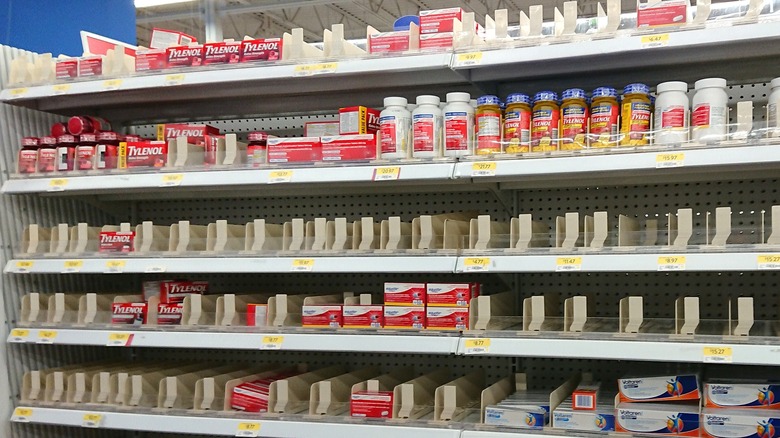Recent Illness Surges Have Left Pharmacies With A Drug Shortage
This year's flu season, combined with a surge in respiratory syncytial virus (RSV) and lingering COVID-19 infections, has strained emergency rooms and pediatrician offices (via CNN). Now, pharmacies are seeing their shelves empty of common over-the-counter (OTC) children's versions of medications such as Tylenol and Advil. Although flu antivirals such as Tamiflu are in demand for similar reasons, these drugs aren't in short supply nationwide, though there are pockets of local shortages (via Today). According to the Washington Post, the shortages of children's acetaminophen and ibuprofen are also isolated to certain areas of the United States.
In addition, the Food and Drug Administration has reported shortages of amoxicillin and Adderall, as well as some pediatric injectable medications. CNN reports that injectable drugs tend to be in short supply because they cost more to produce and don't bring in as much profit for drug manufacturers. The American Society of Health-System Pharmacists says that amoxicillin capsules and tablets are available, but some oral powder for suspensions of the antibiotic is on backorder and won't be available until mid-January 2023.
Although the FDA is working with drug manufacturers to boost the supply of these medications, controlled substances like Adderall could remain in short supply until next year because the Drug Enforcement Administration restricts its production (via CNN).
How to get around the drug shortage
According to the Washington Post, you can look for a store or generic brand of acetaminophen to replace Tylenol and of ibuprofen for Advil. Also, children don't necessarily need medication to treat a fever unless it's severe. "A fever itself is not dangerous unless it gets super high, super quick," says Dr. Joanna Dolgoff, a pediatrician and spokeswoman for the American Academy of Pediatricians. To help make them comfortable, you can keep your child's room cool and be sure they drink enough fluid while they're sick. But refrain from giving children adult forms of medication, particularly infants. Check with your pediatrician to see if an older child can handle either chewable or tablet forms of medication to spare the liquid forms for infants who need them.
If your child has a common cold or the flu virus, an antibiotic won't fight the virus, according to the University of California Davis. Antibiotics are intended for bacterial infections such as strep throat and pneumonia.
According to Today, an antiviral such as Tamiflu needs to be taken within 48 hours of flu symptoms appearing. Antivirals only treat, rather than cure, the flu. If the drug isn't available or difficult to obtain within that time window, ask your doctor if it's necessary, particularly if you're not at high risk for flu complications. Non-severe cases of the flu can be treated at home through rest, hydration, and reducing fever.


